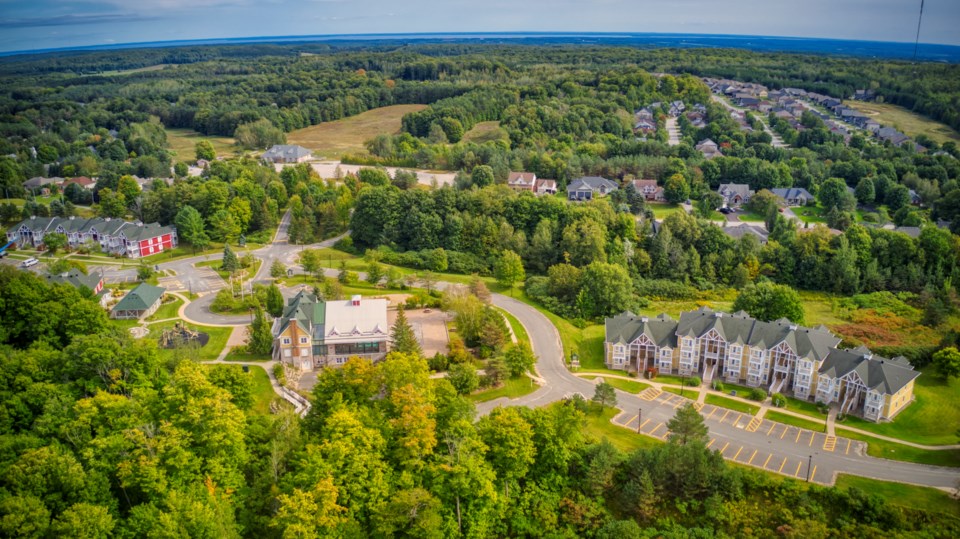By the time the virtual court went live online today, more than 500 people had logged on to finally hear — after more than two years — how much of the thousands they had paid into their Horseshoe Valley timeshare ownership they would get back.
Carriage Hills and Carriage Ridge are no longer. The boards of the Simcoe County timeshare resorts determined their continued operation was no longer financially viable. Receivers were hired and they were sold last year.
The Oro-Medonte Township properties adjacent to the local ski resort have since been converted into condominiums.
“What a great resolution we’ve had,” said Cheryl Chaytor, who was involved in Facebook groups designed to convey information about the dissolution process to thousands of timeshare owners. “We’re getting more than double what my greatest expectation was.”
During Tuesday’s Superior Court hearing broadcast through YouTube, Carriage Hills timeshare owners learned they would get $4,378.60 if they owned one interval allowing them a week per year at the resort. Carriage Ridge owners would receive $4,754.85 for a one-week-per-year interval.
Those who had one week every second year will be getting half that.
Owners will receive the “interim distribution” by October, they were told. A final payment, which is expected to be much smaller, could follow next year after all final costs are determined and the entire estate is wrapped up.
“It’s been a herculean task, actually,” said Justice Barbara Conway, explaining that tracking everyone down was complicated by the fact that many of the intervals had more than one owner.
Court heard that the documentation, all on paper and not in an electronic system, was not complete and the record keeping was not orderly.
Every step was labour-intensive, Conway said.
Leanne Williams, a Thornton Grout Finnigan lawyer originally hired by the timeshare boards, told the court there were millions of touchpoints and thousands of owners for the receiver, BDO Canada.
She told the court the receiver was holding $38.5 million for Carriage Hills, $27.09 million of it is being distributed to the owners. The receiver is holding $19 million for Carriage Ridge, and $13.77 million of it will be distributed to those interval owners.
Part of the complication was tracking down default owners, who had given up paying their timeshare fees. Williams said about $1 million was collected from them. Meanwhile, the receiver had won a default judgment against the outstanding delinquent owners — $14 million related to Carriage Hills and $7 million related to Carriage Ridge.
She was hopeful that some of that money would be recovered as well.
The former timeshare units at Carriage Ridge and Carriage Hills sit on 28 acres above the Horseshoe ski resort along the Third Concession. Carriage Ridge contained 78 units within three buildings on eight acres, while Carriage Hills had 172 units in eight buildings on 20 acres.
The timeshare structure was dissolved at the start of 2021 through the ongoing court process, which adopted an online platform during the pandemic to allow for distancing. Hundreds of people regularly signed on through the many appearances, which attracted up to 770 viewers on Tuesday.
The Oro-Medonte resorts were sold to Toronto-based Sunray Group of Hotels Inc. The units were then updated and sold as condos.
At the time, it was estimated that there were about 11,400 individual members — often represented by multiple people — owning a total of 17,408 intervals in the two properties of the former timeshare structure.
Karen Levins has been actively following the process, often with frustration.
In 2002, she purchased an every-other-year timeshare ownership in Carriage Hills for $11,808.25, paying $568.07 in maintenance fees every second year, which rose over the years.
In 2010, she purchased another week every second year for $14,248.70 in Carriage Hills. By then, the maintenance fee was $803.81.
When the resorts closed in January 2021, the maintenance fees had risen to $1488.19, in large part because of an increasing number of default owners who had given up and stopped paying.
“We absolutely recognize there’s been a tremendous amount of effort,” said Levins, who said she was pleased with the progress and the outcome announced Tuesday.
“It’s complicated when you have so many intervals," she added. "It’s complicated when you have so many owners per interval. It’s complicated when so much time has passed since the original purchase of these deeds.”
